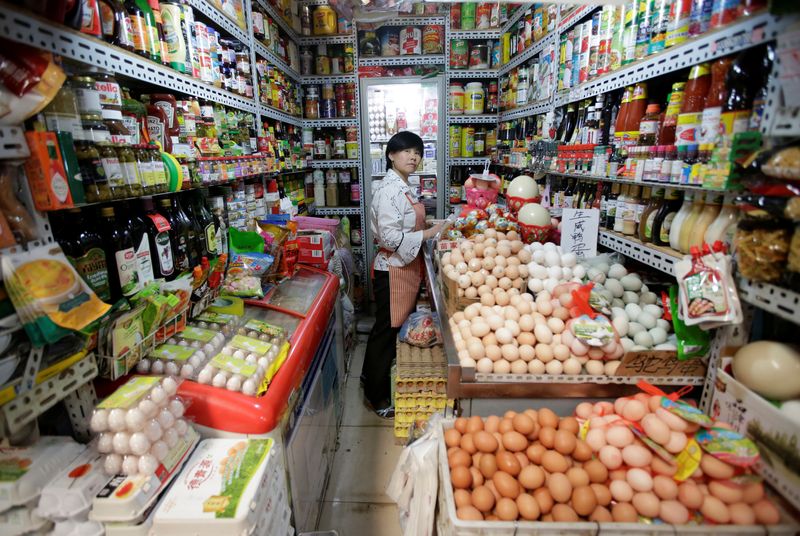China’s consumer prices fall in July as deflation risks build
2023.08.08 23:41

© Reuters. FILE PHOTO: A vendor is seen in her store at a supermarket in downtown Beijing, China, May 23, 2019. REUTERS/Jason Lee
BEIJING (Reuters) -China’s consumer prices posted their first annual decline in more than two years in July, while factory gate prices extended their falls, data showed on Wednesday, as lacklustre demand weighed on the economy.
Below are comments from analysts on the inflation data:
XING ZHAOPENG, SENIOR CHINA STRATEGIST, ANZ, SHANGHAI
“Both CPI and PPI in year-on-year terms fell into negative territory and confirmed economic deflation. The only bright spot was that the core CPI rebounded to 0.8% due to seasonal tourism during the summer, but I am afraid that it may lack sustainability. Given the base remained high last year, CPI will hardly rebound significantly in the second half of the year. It is expected to hover around 0. It would be hard to maneuver monetary policy. The Politburo meeting called for a stable yuan exchange rate, which would conflict with monetary easing.”
TAO CHUAN, CHIEF MACRO ANALYST AT SOOCHOW SECURITIES, BEIJING.
“This is the fifth time we see CPI fall in year-on-year terms since the reform and opening-up. It is mainly dragged by the month-on-month and year-on-year decline of food item. The bright spot is the service item, which turned positive (+0.8%) on a month-on-month basis.
“With destocking and credit expansion, we expect PPI and CPI will rebound from the bottom in the fourth quarter. China launched intensive stimulus measures after the July politburo meeting, it will take time to reflect. The central bank may cut interest rates by another 10bp in the rest of the year. At present, the economy is recovering from the bottom, and I believe it will not take too long for the data to bottom out.”
FRANCES CHEUNG, OCBC BANK, RATES STRATEGIST, SINGAPORE
“Market needs to see more actionable support measures from the Chinese authorities to stay upbeat. While there is room for some mild monetary policy easing, onus is on the fiscal side. Otherwise, economic data showing some growth improvement is required, which is not coming through yet.”
HU YUEXIAO, CHIEF ECONOMIST AT SHANGHAI SECURITIES, SHANGHAI
“The CPI fell to the negative territory in July, as expected. We had forecast negative CPI and PPI in the third quarter. However this is not deflation in a traditional sense, as it does not point to cyclical sluggishness. Rather it’s mainly shrinkage from a statistical sense – key indicators like pork prices remain low due to structural changes, while commodity prices are also soft due to non-economic reasons. Negative CPI and PPI opens up room for rate and RRR cut later this year, which would potentially benefit the capital market.”
ZHIWEI ZHANG, PRESIDENT AND CHIEF ECONOMIST, PINPOINT ASSET MANAGEMENT, HONG KONG
“Both CPI and PPI are in deflation territory. The economic momentum continues to weaken due to lacklustre domestic demand. It is not clear at this stage if the policies announced recently can turn around the economic momentum soon. The CPI deflation may put more pressure on the government to consider additional fiscal stimulus to mitigate the challenge.”
MARCO SUN, CHIEF FINANCIAL MARKET ANALYST, MUFG BANK (CHINA), SHANGHAI
“The consumer inflation in year-on-year terms was affected by the pandemic last year and the rebound in consumer spending and pent-up demand after the lockdown. In addition, the year-on-year drop in CPI in July this year was also affected by the uncertainty around the pace of broad macro economic recovery.
“I expect China to further lower policy rates in the second half of this year and such monetary easing could help promote recovery on the supply side and stabilize the demand side.”
XIA CHUN, CHIEF ECONOMIST, YINTECH INVESTMENT HOLDINGS, HONG KONG
“The lower inflation data reflects weak demand on the mainland, which is biggest challenge facing China’s economy. We see revenge consumption in other countries and areas after COVID lockdown was dismantled. In mainland China, we see the opposite, which is revenge deposit. Deflation will last for six months to 12 months. But China will not follow the path of Japan, where deflation is much severe, and persisted in half of the past two decades.”
GARY NG, ASIA PACIFIC SENIOR ECONOMIST AT NATIXIS
“Although the headline CPI and PPI suggest a deflation story, the pressure is not as large as it is mainly driven by lower food, energy and commodity prices. For China, the divergence between manufacturing and services is increasingly apparent, meaning the economy will grow at two speeds in the rest of 2023, especially as the problem in real estate re-emerges. It also shows China’s slower-than-expected economic rebound is not strong enough to offer the weaker global demand and lift commodity prices.”








